Ashley Choi Found Her Collaborative Community at Charlotte
On December 13, Ashley Choi will graduate from the Klein College of Science with a bachelor’s of science, majoring in biology and minoring in biotechnology. She hopes to take the culture of collaboration she found on Charlotte’s campus with her as she diversifies her lab experience as a research technician before continuing her education.
“I love Charlotte for its community, I feel like everyone has a space here,” Choi said. “The people are so welcoming, you can find community anywhere.”
Choi grew up in Cary, North Carolina, in a close-knit and entrepreneurial family including her grandparents, parents, and brother. While Choi was active in many extracurriculars, including music, sports and art, she thrived as a member of Athens Drive High School’s color guard team.
“I just love the collaborativeness and feeling as one,” Choi reflects. “I like being able to root for other people’s success and feel like other people are also rooting for my success.”
While applying to colleges, Choi hoped to find a similar community built upon mutual support. “I wanted to meet other people and find new connections, it was a plus that the research here is also amazing,” she said.
In the lead up to freshman year, Choi participated in the University Transition Opportunities Program (UTOP), UNC Charlotte’s rigorous six-week summer program where she enjoyed completing an extra seven credits and acclimating to campus life. Choi met her best friend at UTOP, and it’s a connection that she’ll always be grateful for.
Joining the Truman Lab
Choi’s interest and talent in the sciences began in middle school, and after taking a molecular biology course in which she excelled, she solidified her path as a biology major.
In 2022, Choi joined Andrew Truman, Ph.D.’s lab, which was recently awarded a new R01 grant from the National Institutes of Health (NIH). Choi worked alongside the lab’s undergraduate, graduate and postdoctoral researchers on understanding the Chaperone Code, the myriad of post-translational modifications that impact the function of the Hsp70 molecular chaperone.
“Research wasn’t something I was very interested in until I joined the lab,” she said. “I feel very lucky that Dr. Truman and his lab are very collaborative and supportive.”
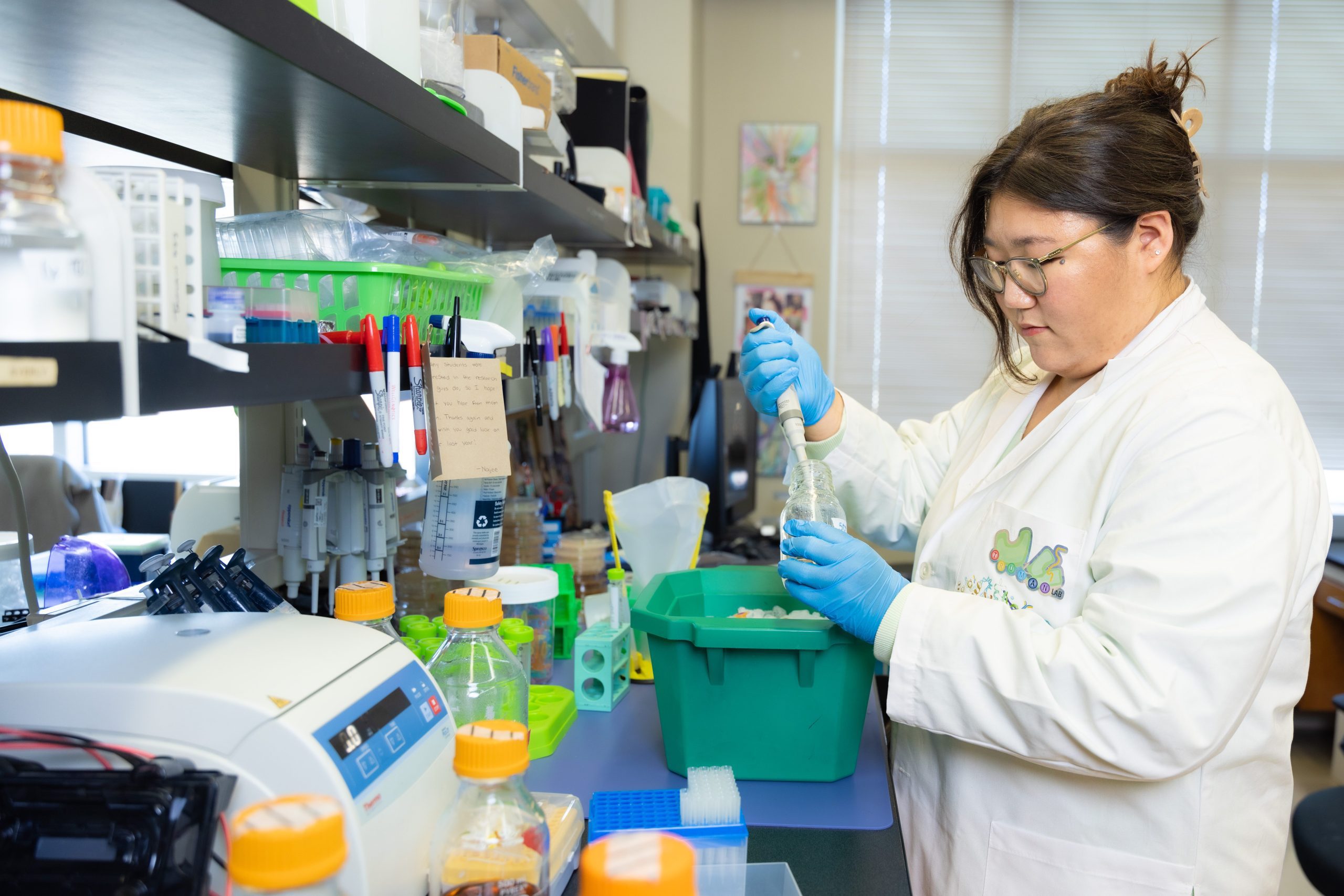
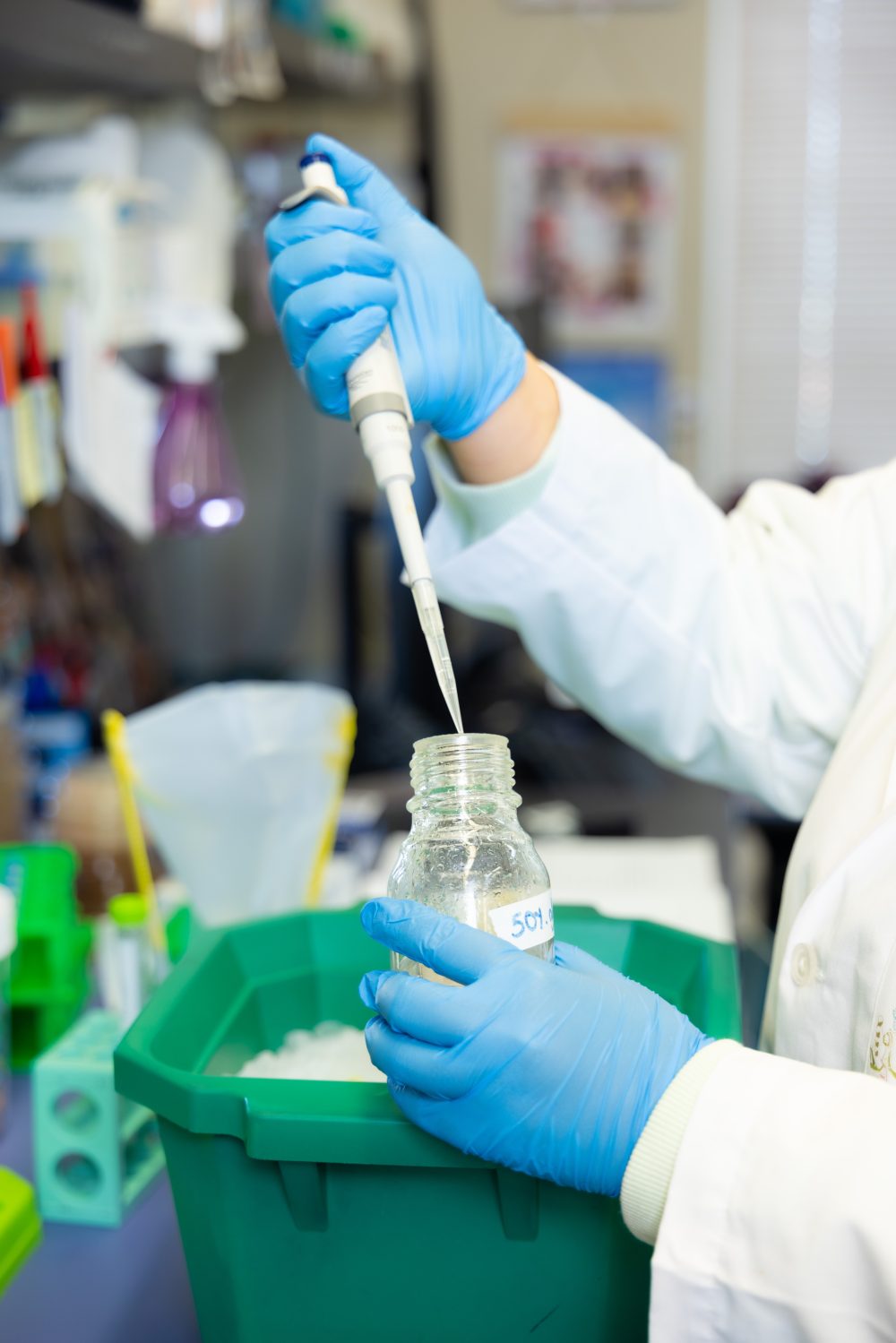
Her current project is focused on Cdc37, a co-chaperone to Hsp70. Cdc37 is specific to the cell cycle and is important to protein folding, cell division, cell death, invasions such as viral infections, blood vessel formation, and protein stabilization, which are relevant to understanding and combating cancers and neurodegenerative diseases. Her previous research in the lab has also explored v-Src, an important driver of cancer, and the Client Code, a collection of proteins that interact with Hsp70.
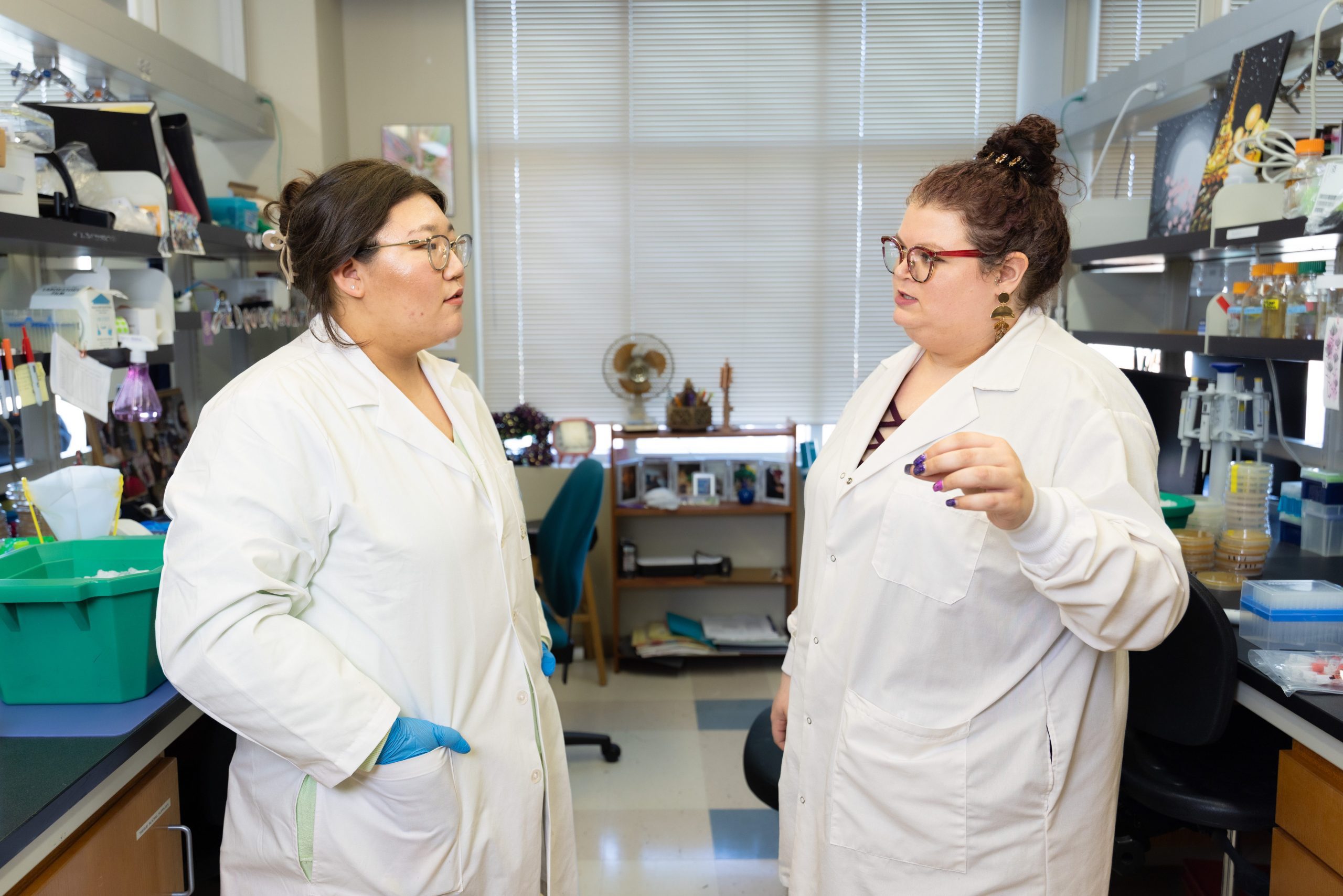
From Choi’s experience, what makes UNC Charlotte stand out as a top-tier research institution is the opportunity for undergraduates to feel empowered to lead their own research projects. “When I go to these national conferences, many people assume I’m a graduate student because of how much understanding and first-hand experience I have working on these projects,” she said.
Choi has enjoyed passing on the knowledge she has gained to new researchers, and is thankful for her own mentor, Ph.D. student Megan Mitchem, for leading by example. “My mentor Megan helps me with both my scientific struggles and personal struggles,” Choi said.
In addition to her research in the Truman lab, Choi works as a Communications Consultant within the Department of Biological Sciences. She assists both the cell biology and microbiology labs by reviewing assignments and helping students improve their scientific communication skills.
Campus Involvement
As an active member of the Society for Advancement of Chicanos/Hispanics and Native Americans in Science (SACNAS), Choi received a 2024 SACNAS Travel Scholarship to attend her second NDiSTEM conference this year.
Seventeen UNC Charlotte students were present in Phoenix, Arizona as the chapter received the 2024 Outstanding Chapter Award for Long-Term Sustainability.
Choi has received multiple awards and funding while at UNC Charlotte, including the Office of Undergraduate Research’s Travel Award in 2024, SACNAS 2023 C.O.L.O.R. funding, and the Office of Undergraduate Research Conference’s Best Poster Award in the Science, Technology, & Engineering category in 2023.
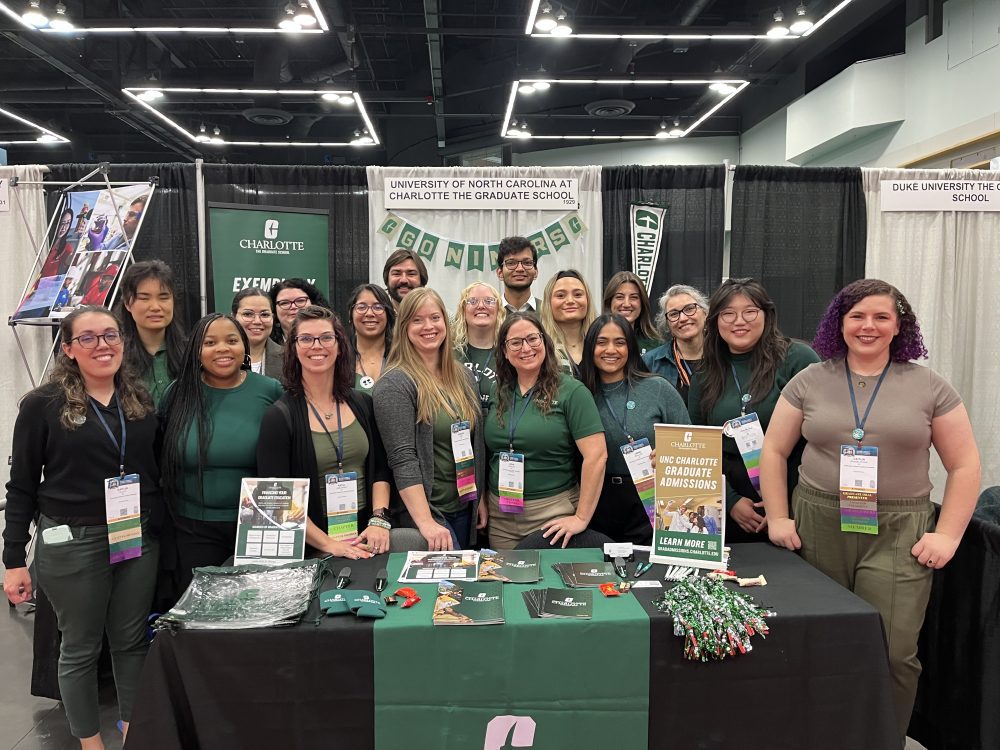
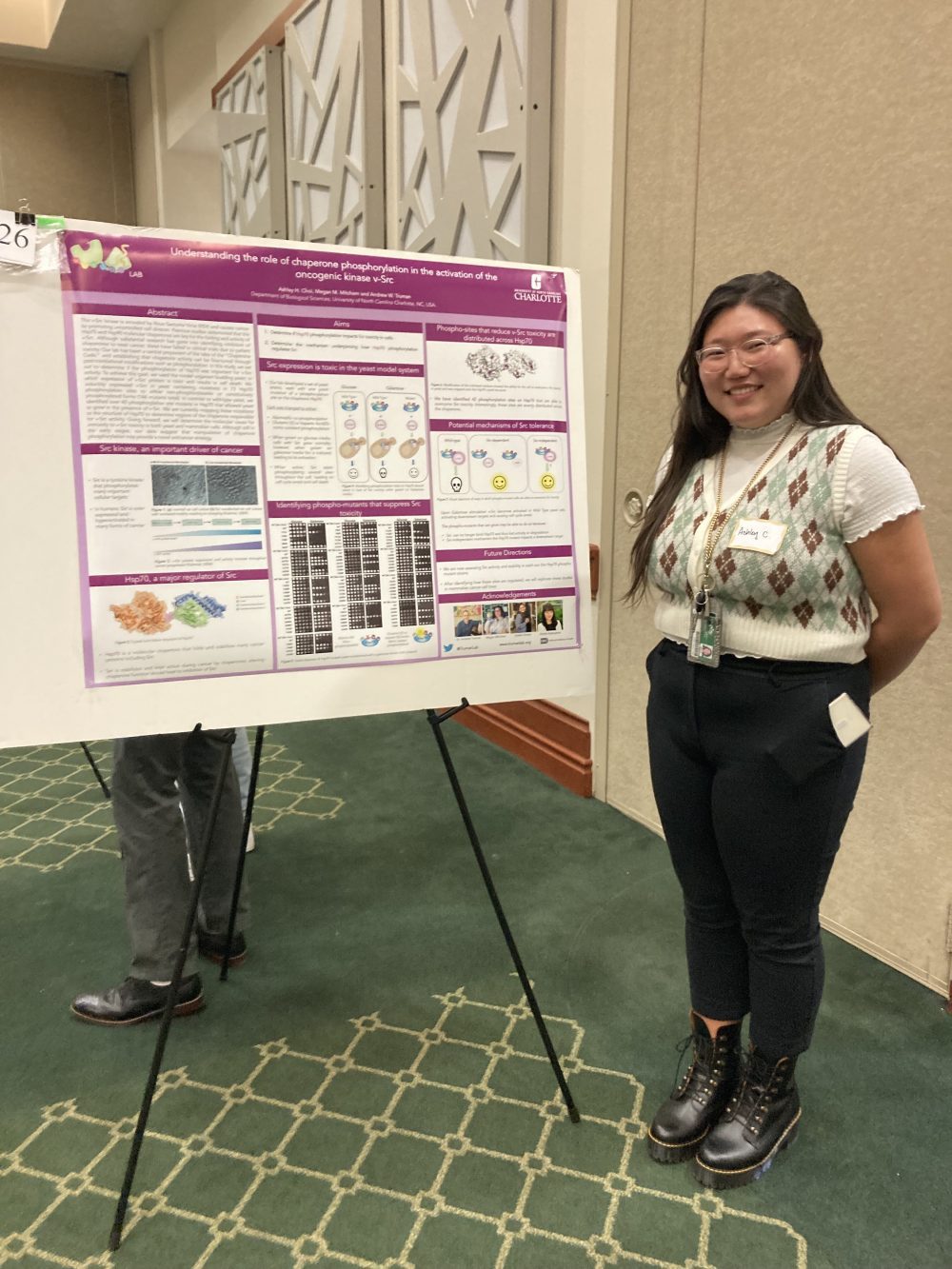
Looking ahead
As Choi begins the interview process for lab positions after graduation, she is looking forward to continuing to seek out new challenges to diversify her skill set. “Going to different places and learning new skills is very important, I think it makes you a better researcher and a better scientist,” she said.
During her challenging personal experiences during the worst of the COVID-19 pandemic, she found herself as a passionate health advocate for the first time. After developing additional lab skills, she plans to pursue an M.D./Ph.D. dual program and continue on to work as a physician scientist.
Biology Major Madison Riley takes her turn on “The Price is Right”
When Madison Riley, a junior biology major, went on the game show “The Price is Right,” she wore a t-shirt that said “Don’t pick me, pick my sister.”
That shirt, coupled with a nervousness that turned into a dynamic television personality, got her called down to contestant’s row to bid on items including an elliptical machine and some luggage. Riley beat out the other contestants and won the bid for luggage, which she realized was a more expensive item after her family trip to California to be on the game show.
Riley moved on stage with host Drew Carey to play the grocery pricing game “Bullseye,” and was able to win the prize of two airfare tickets to Key West, Florida. She was one of two winners from the episode that was filmed this summer and aired on Oct. 7.
Like her t-shirt said, Riley is picking her sister for the trip to Key West. “I couldn’t think of taking anyone else but my sister,” said Riley. “She was the reason I was picked, and I’m really excited to take the luggage I won.”
Read the full story of Madison Riley’s turn on “The Price is Right.”
Truman Lab awarded new R01 grant from the National Institutes of Health
The Klein College of Science’s Truman Lab has been awarded a new R01 grant from the National Institute of General Medical Sciences (NIGMS), part of the National Institutes of Health (NIH). From 2024 to 2028, the new grant will provide $1,278,920 for the project “Understanding the role of Hsp70 chaperone code in proteostasis,” adding to their research funding totaling over five million dollars.
“Andrew Truman is an incredible collaborator and a supportive mentor to so many students. He is leading the researchers in his lab to explore some of the fundamental aspects of a specific protein which could bring exciting developments to understanding diseases like cancer,” said Bernadette Donovan-Merkert, Ph.D., founding dean of the Klein College of Science. “The Truman lab has been quite successful in securing concurrent R01 funding for their innovative, ongoing research.”
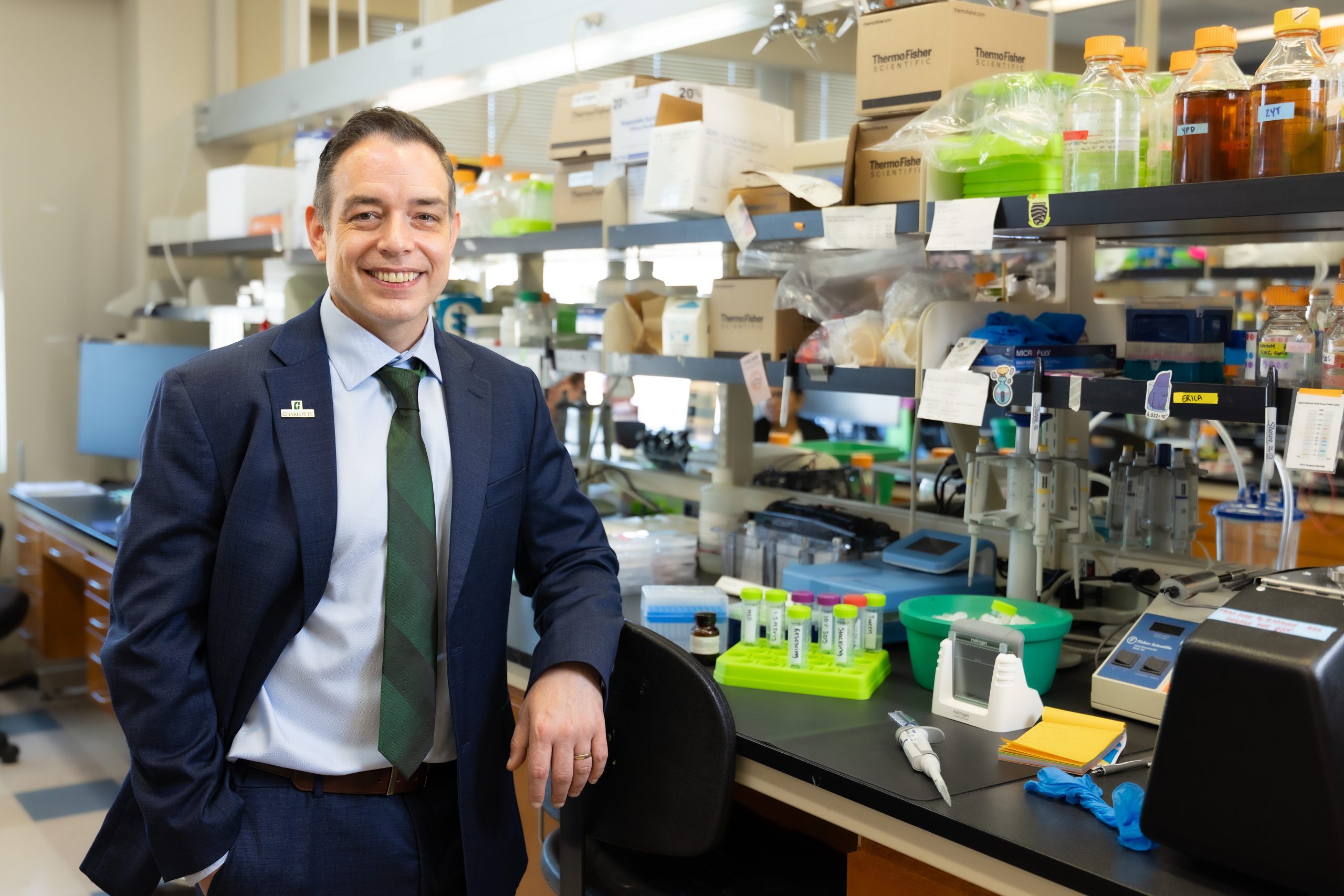
The Truman Lab was established in 2015 by Andrew Truman, Ph.D., professor in the Department of Biological Sciences, group leader of the Charlotte Group for Proteostasis Research (CGPR), and affiliate faculty in the School of Data Science. After obtaining his Ph.D. in Biochemistry at University College London, Truman worked as a postdoctoral researcher at Johns Hopkins University and Boston University. As a research assistant professor at the University of Chicago, he published the first detailed study on Hsp70 phosphorylation.
The Truman Lab conducts research within their laboratory space and dedicated cell culture room located in Woodward Hall, a state-of-the-art science and technology building on the UNC Charlotte campus. The lab’s research focus is understanding the Chaperone Code, the myriad of post-translational modifications that impact the function of the Hsp70 molecular chaperone.
“Chaperone proteins are like mechanics that shape proteins and fix them up,” Truman explained. “They are present in all organisms, from bacteria, yeast, frogs, flies and humans, and are essential for life.”
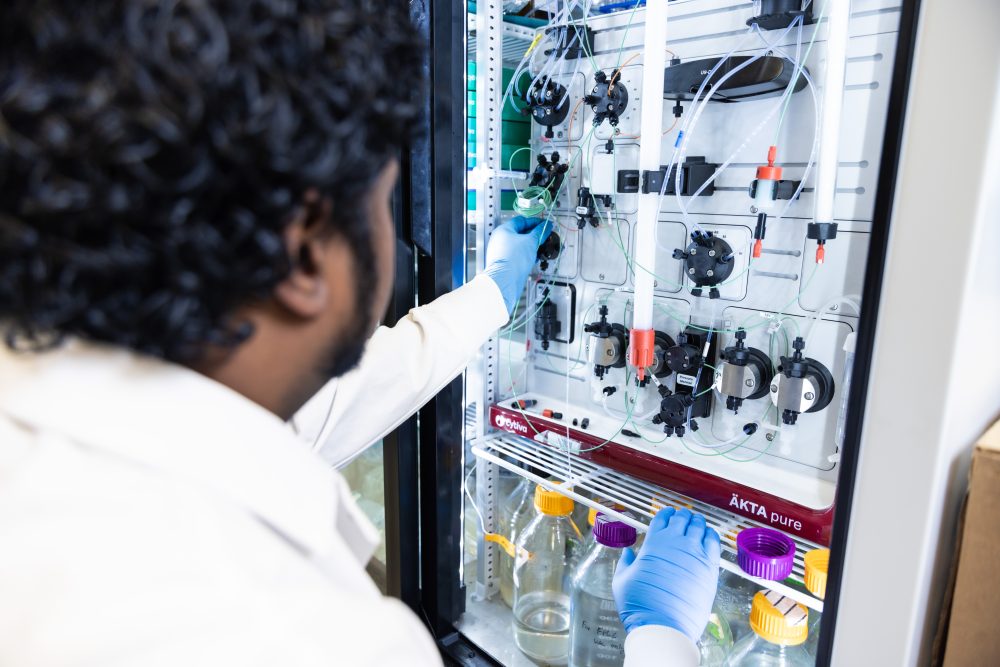
The Truman Lab studies these hundreds of modifications on chaperone proteins in order to understand why a cell would put these modifications on and how they are regulated on a normal cell versus in disease. “You don’t just get one single modification, you have hundreds coming on and off depending on what a cell is exposed to, like heat, starvation, DNA damage, viruses, bacteria, or infection,” said Truman.
The lab consists of around 10-15 undergraduate, graduate and postdoctoral researchers who work collaboratively to study all aspects of the chaperone code, from an evolutionary perspective through to the implications for human disease.
“We work closely with our mentors, which we’re each assigned, and help with projects. First we were just training with them, and now we have our own projects,” said Erica Flores, a senior majoring in biological sciences and minoring in public health. Flores is the vice president of the UNC Charlotte chapter of the Society for Advancement of Chicanos/Hispanics and Native Americans in Science (SACNAS) and won the C.O.L.O.R. Travel Award at the SACNAS NDiSTEM conference this year.
The majority of the data that formed the basis of the new R01 grant was obtained by graduate student Siddhi Omkar, as part of her Ph.D. project. Omkar defended her thesis this November, only a couple of months after giving birth to her son, and will be joining the group as a postdoctoral researcher in January 2025.
As a first-generation college student, Truman is a big proponent of science outreach and encourages and empowers his researchers to speak and write about their work. “It’s rewarding to do exciting experiments and get novel results,” said Duhita A. Mirikar, a third-year Ph.D. student. “Dr. Truman motivates us to go to conferences, write reviews and publish articles.”
Megan Mitchem, a current Ph.D. student, visits local elementary schools to talk about science. “One of the things I enjoy the most is taking something that is really complex and being able to translate it into something I can talk to my family or friends about,” Mitchem said. “That was not something I was exposed to growing up, and I have a twelve-year old who I want to be able to communicate with about science and get him involved.”
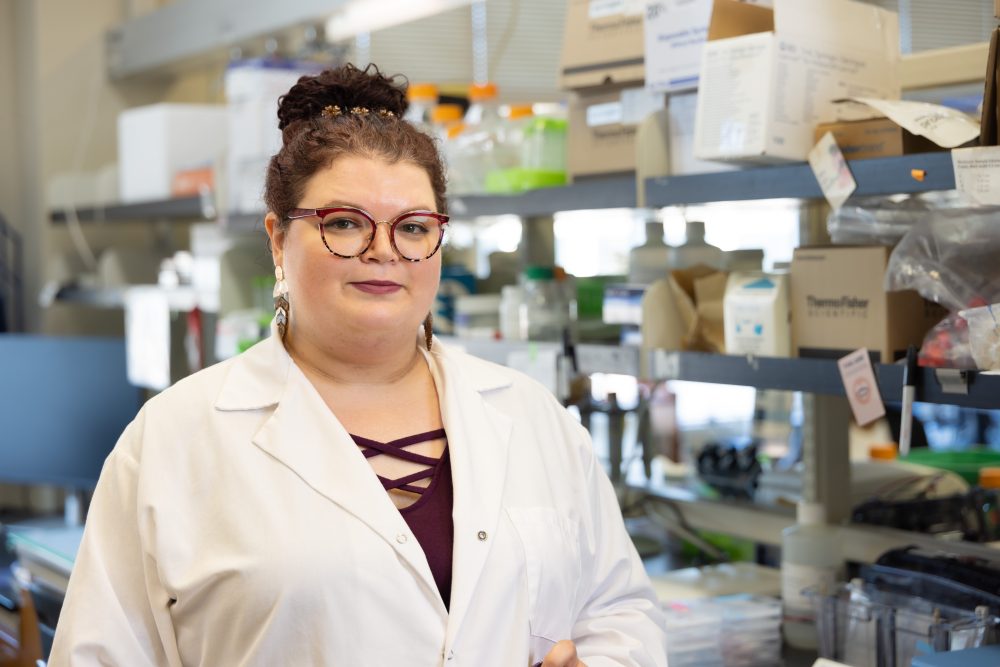
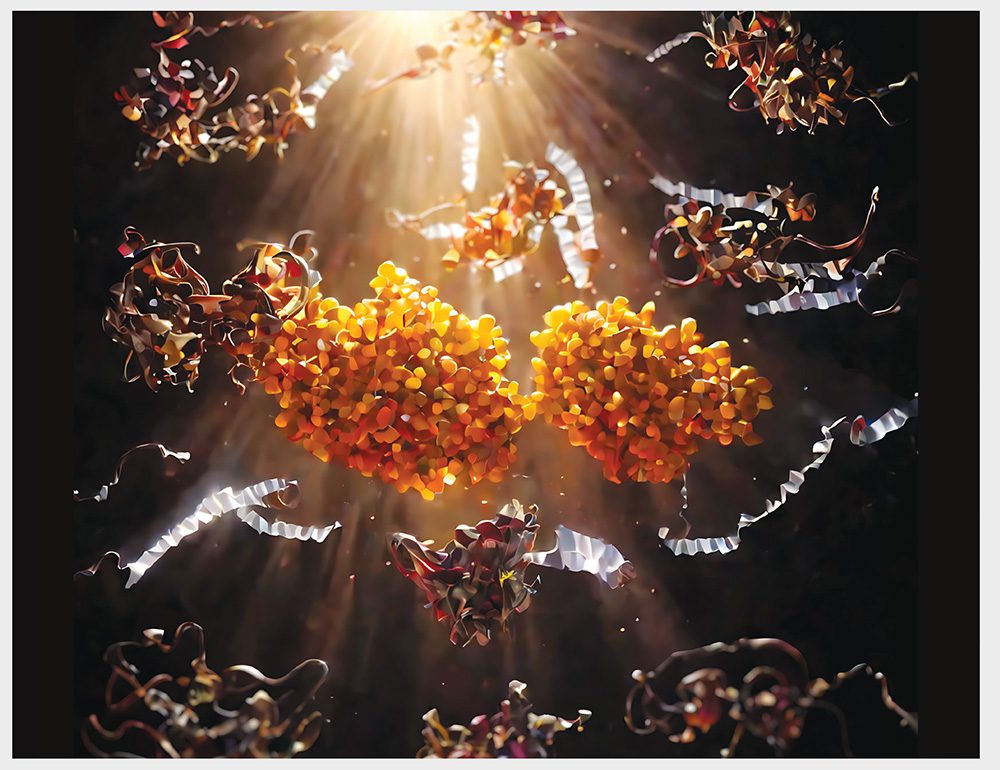
Mitchem is a first-generation college student herself, and she obtained a bachelor’s degree and a master’s degree in biological sciences from UNC Charlotte. She is a 2023 NSF Graduate Research Fellow and received a Ford Foundation Pre-Doctoral Fellowship Honorable Mention in 2023, making her the first student at UNC Charlotte to receive this distinction.
Mitchem is passionate about combining her creativity and scientific knowledge, and her art piece depicting Hsp70, “Guardian of the Cell,” was selected by American Society for Biochemistry and Molecular Biology (ASBMB) as one of the winners of the 2024 Molecular Motifs bioart competition. The piece will be featured in ASBMB’s upcoming 2025 calendar. “Being able to have something that’s aesthetically pleasing makes it easier for the reader or anyone who interacts with the material to get a sense of what is going on,” Mitchem said.
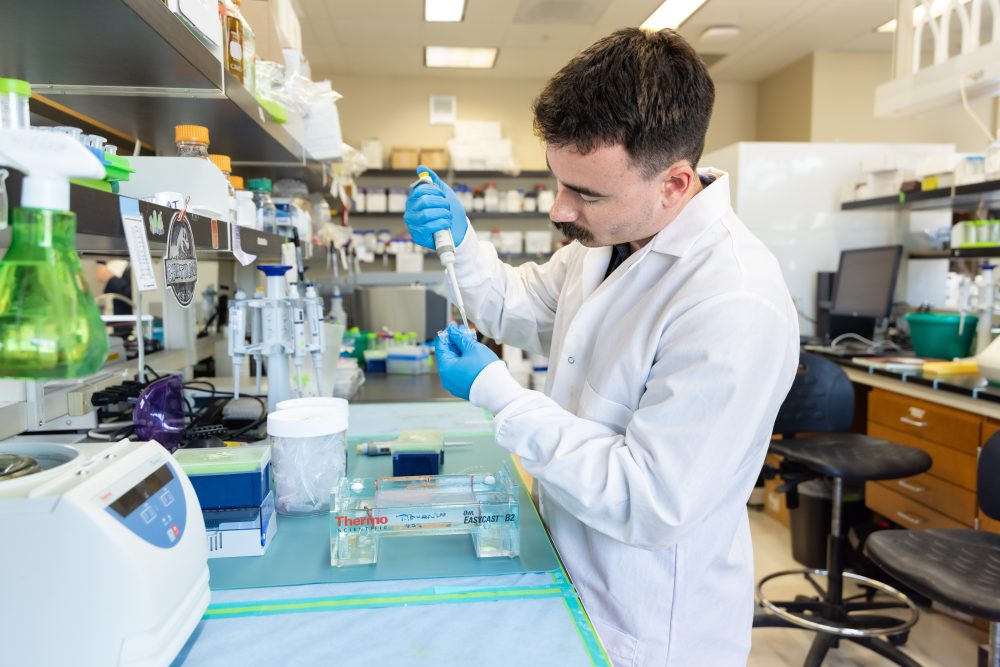
Postdoctoral researcher Yevheniia Bushman, Ph.D., came to UNC Charlotte specifically to learn from Truman’s expertise in Hsp70 and is glad that she did. “Dr. Truman is one of the best mentors that I’ve ever met, he’s really encouraging and we celebrate all of the ups and downs,” she said. Bushman’s undergraduate mentee Nick Maynard, a senior who recently joined the lab, said the most rewarding part is getting to be hands on and seeing things work. “You prepare for a very long time, so when you finally run an experiment or a component of an experiment and it works out and you get the result that you hypothesized or were looking for, it’s very satisfying,” Maynard said.
As part of his teaching and mentorship approach, Truman believes that one of the most important qualities to have in science is kindness. “I think that can be lost, especially because science is so competitive with grants and papers and things like that,” he said. The spirit of collaboration is a big reason that Truman was drawn to UNC Charlotte, and he emulates that in his lab, the Department of Biology, the Klein College of Science, and beyond.
“We collaborate with around 80% of the department, and we have collaborations with chemistry, physics and bioinformatics,” Truman said. These values have translated to the researchers in the lab, who all describe Truman’s teaching and mentorship style as positive, collaborative, and knowledgeable.
On October 21, Truman Lab members presented their research at the 10th Annual Biological Sciences Symposium held on campus. Bushman and Chathura Paththamperuma, Ph.D., presented their research during the postdoctoral oral presentations, while Mirikar presented during the graduate oral presentations. The afternoon poster session showcased research by Mitchem, Flores, Ashley Choi, and Shreya Patel. Flores was awarded third place for the Undergraduate Student Poster Presentations, and Patel received the Undergraduate Outstanding Scientific Communicator award.
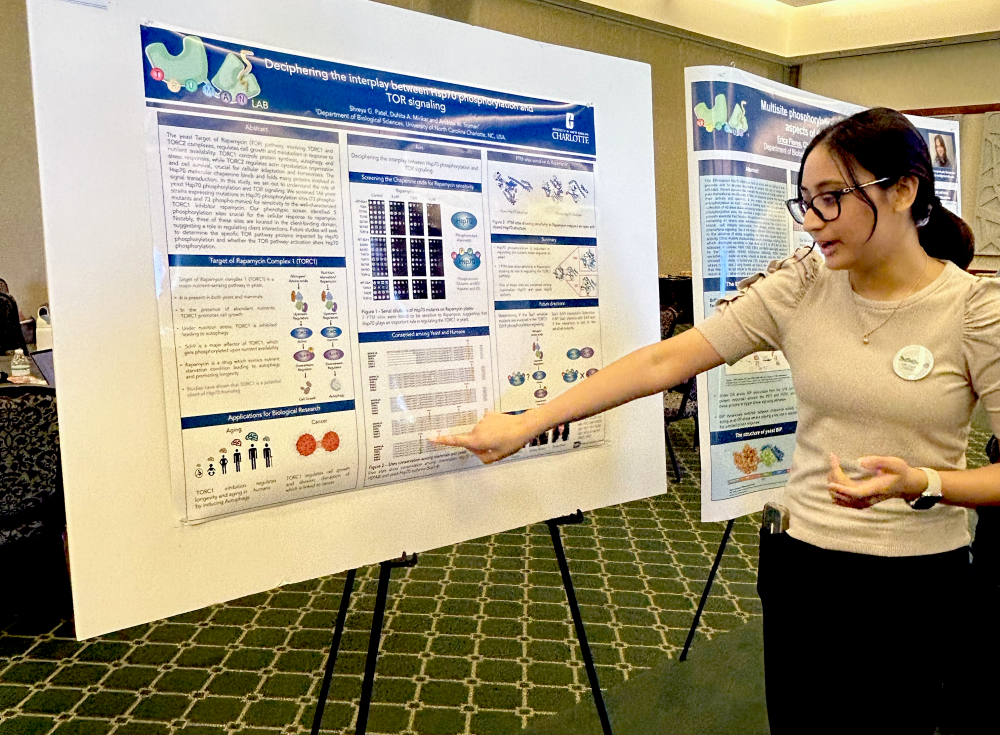
Truman is proud of their lab and the contributions to the success of the university. “UNC Charlotte is on a meteoric rise upwards through the upcoming R1 status,” Truman said. “Student enrollment has gone up, we jumped fifteen spots to 81st [in U.S. News & World Report’s 2025 Best Colleges rankings], and the university is interested in expanding core facilities which will allow us to increase our research, draw in more researchers and submit larger grants.”
The Truman lab currently receives over $5.1 million provided by four different NIH agencies including NIGMS, the National Institute of Neurological Disorders and Stroke (NINDS), the National Institute on Aging (NIA) and the National Institute of Allergy and Infectious Diseases (NIAID). NIGMS supports research that increases the understanding of biological processes and lays the foundation for advances in disease diagnosis, treatment and prevention.
In addition to his work in the lab, Truman is the senior editor of Cell Stress and Chaperones. He has authored over 60 papers in scientific journals including Cell, Molecular Cell, Cell Reports, PLOS Biology, PLOS Genetics and Journal of Biological Chemistry. More information about the team, research grants and publications can be found on the Truman Lab website.
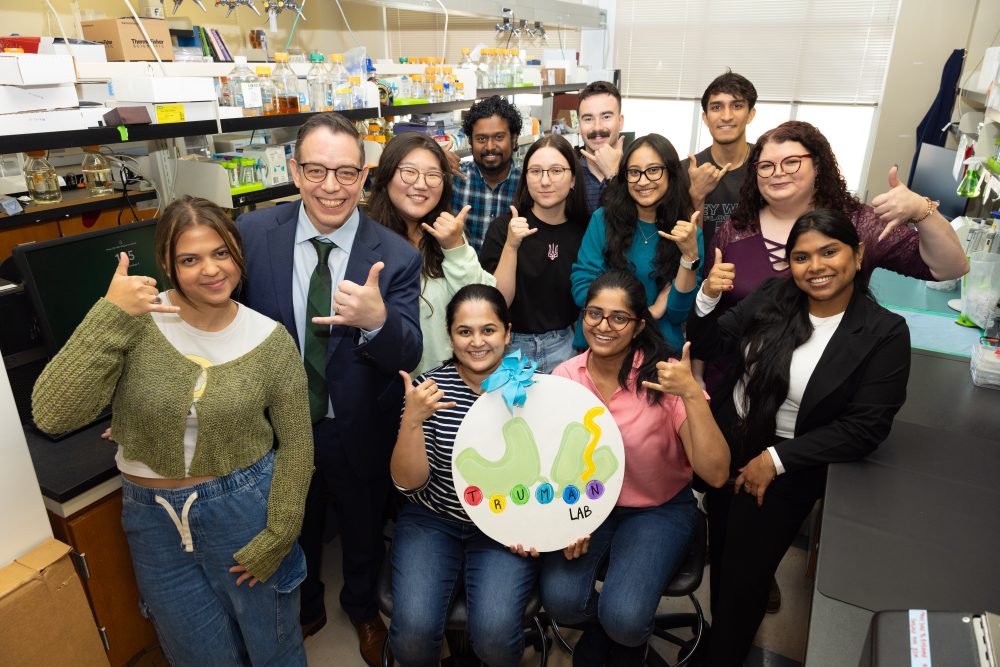
Eight KCOS faculty recognized with ‘Trailblazer Award’
The Center for Teaching and Learning celebrated their 25 year anniversary on November 1 and recognized eight faculty members from the Klein College of Science with the “Trailblazer Award.”
CTL recognized faculty with the award who have demonstrated exceptional commitment to innovation in teaching and dedication to enhancing student success. This award honors educators who have pushed boundaries in the classroom and online, and inspired transformative learning experiences.
Honoring their pioneering spirit, the Trailblazer Award highlights the impact of their contributions, their partnership with the CTL, and inspire future generations of educators to continue reimagining teaching practices.
Trailblazer Award winners from the Klein College of Science:
- Kathy Asala, chemistry
- Tonya Bates, biological sciences
- Farzana Ferdous, biological sciences
- Wan Rabiatul Hountondji Wan Othman, mathematics and statistics
- Lee Rinker, mathematics and statistics
- Jennifer Reed, mathematics and statistics
- Shankari Somayaji, biological sciences
- Sam Suptela, biological sciences
Center for Biomedical Engineering and Science moving to KCOS, Richardson named as Director
Christine Richardson, Ph.D., professor and chair of biological sciences, has been selected to serve as the next Director of the Center for Biomedical Engineering and Science. Her term will run through June 30, 2028.
With this new role, CBES is shifting to the Klein College of Science with the support of researchers from across campus, including strong faculty collaborations from the William States Lee College of Engineering. Since the Woodward building opened in 2005, it has been home to research labs from bioengineering and biological sciences, which encourages collaboration.
Richardson will remain in her role as Chair of the Department of Biological Sciences and will lead CBES as a prominent hub for biomedical research in the Charlotte region and beyond, elevating the role of interdisciplinary biomedical research on campus.
“CBES is known for its translational research and there are so many opportunities in the field right now. The center will support the variety of biomedical researchers we have, forge new partnerships, develop industry opportunities and drive innovation to advance science,” said Bernadette Donovan-Merkert, founding dean of the Klein College of Science. Additionally, the center will help attract top-tier faculty as they will have a “community of eager, interdisciplinary researchers just waiting for them,” said Donovan-Merkert.
Richardson earned her undergraduate degree in molecular biology from Princeton University and her Ph.D. in genetics and development from Columbia University Medical Sciences Center. Her postdoctoral fellowship at Sloan-Kettering Institute continued as a research associate in the Department of Cell Biology and Genetics. She also held an assistant professor role at Columbia University at the Institute for Cancer Genetics and Department of Pathology.
Richardson has previously held several leadership roles at Charlotte, including as director of the Research Experience Undergraduate (REU) program and the master’s and doctorate graduate programs in the Biological Sciences department. She currently serves as Honors College faculty and is the founder and director of two graduate certificate programs in the department. Richardson is a member of many national societies and has mentored students from high school to the doctoral level, including as PI in the Bridges to Baccalaureate program, with an NIH grant that offers intense advising to community college students to complete a biomedical sciences degree at UNC Charlotte. She is a co-PI on three additional active grants, has authored numerous papers, holds patents and presents regularly at conferences.
“I am thrilled and honored to take the reins to lead the Center for Biomedical Engineering and Science. I look forward to working closely with university and community stakeholders in the years to come and continue to build on the Center’s excellence that my predecessors Robin Coger and Charles Lee started,” said Richardson.
“I am grateful to Dean Bernadette Donovan-Merkert, Division of Research Vice Chancellor John Daniels and Associate Vice Chancellor Deb Thomas, for their confidence in me to lead CBES. Since its inception, CBES has brought together a diverse group of scientists and engineers from across the university and regional biomedical partners at Atrium Health and Wake Forest. Charlotte has become an ever-increasing hub for the biosciences. With UNC Charlotte’s top-tier research status, the opening of the Pearl District and Wake Forest Medical School, Charlotte’s campus provides an ideal platform to bring together cutting-edge regional research partners and develop multi-institutional partnerships to develop innovative solutions to today’s biomedical challenges,” Richardson said.
Sarah Stellwagen discusses insect issues in Hurricane Helene Recovery
Sarah Stellwagen, Ph.D., assistant professor of biological sciences, was quoted extensively in an article from the Charlotte Observer about the issues from insects as communities recover from Hurricane Helene.
In the article “Helene wrecked their Western NC towns and homes. Then came the bees and fire ants,” Stellwagen reflected on the challenges posed to humans when insects are disturbed by the storm.
“As people are out there moving debris around and getting their property back in order, I think they’re probably coming in contact with these things more than they normally would,” said Stellwagen.
Just like humans, the insects are looking for new homes. “If your habitat was disturbed, you’re going to go out and look for more places to live,” said Stellwagen. Still, the insects play an important role in the ecosystem, moving along waste and rotting materials after the floods receded. “There’s lots of (insects) cleaning up the organic material as well,” said Stellwagen.
Kristen Funk Quoted in article on dementia risk from infections
Kristen Funk, Ph.D., assistant professor of biological sciences, was quoted in an article from the Washington Post on some new research that links an increased risk of dementia to serious infections including flu, herpes and respiratory tract infections. Funk weighed in on the findings from other researchers as an expert on neuroinflammation of neuroinfectious and neurodegenerative diseases.
“Vaccines are going to be the most protection against both the acute infections as well as these post-infectious effects,” said Funk.
Chemistry students named national Top 5 Finalists for Invention Detecting Illicit Drugs
The UNC Charlotte team of chemistry researchers traveled to Washington D.C. on Oct. 16-18 to attend the Collegiate Inventors Competition awards, after being named national finalists in September.
Finalist teams, consisting of 19 students from nine colleges and universities across the United States, presented their inventions to an esteemed panel of final-round judges composed of the most influential inventors and innovation experts in the nation — National Inventors Hall of Fame Inductees and United States Patent and Trademark Office (USPTO) officials.
Students Naz Fathma Tumpa, a nanoscale chemistry Ph.D. student, and Aiden Hawkins, a senior chemistry major working toward a bachelor’s of science degree, worked with advisors Michael G. Walter and Tyler J. Adams on their invention “Color-Metric Sensing of Amine Compounds for Illicit Drug Detection.” Using a bright, color-changing solution, they can test for drugs like fentanyl, heroin and cocaine, which all contain an amine compound.
The team placed in the national Top 5 of 300 teams and said that they learned a lot in the process of their application and presentation to the panel of final-round judges. The team from the Walter lab was the first-ever group to apply for the competition from UNC Charlotte.
With Tumpa and Hawkins conducting research together, they mark the first-ever finalist team with both a graduate and undergraduate student since the Collegiate Inventors Competition began in 1990. The competition is a program of the National Inventors Hall of Fame and is sponsored by the USPTO.
“It really was an honor seeing Naz and Aiden represent our school in this way and it’s an impressive tribute to the importance of research at UNC Charlotte for students at all levels. They did an interview with PBS news hour for a special series, and were in lots of pictures and video for the competition,” said Walter, professor of chemistry and director of the nanoscale science Ph.D. program. “Naz and Aiden will be permanently recognized as one of the finalist teams for 2024 by the National Inventors Hall Of Fame and their project board will hang in the first floor of the USPTO for the rest year.”
Learn more about the impact of their invention:
Meet: Alex Suptela, Biological Sciences Postdoctoral Fellow
Alex Suptela, Ph.D. is a postdoctoral fellow in biological sciences and two-time UNC Charlotte graduate, earning both a master’s and doctorate degree in biology. Suptela also attended Gardner-Webb University and double majored in biology and psychology with a minor in chemistry. Suptela is from Gastonia, NC and his dream job is to become a teaching professor.
Can you share some unique aspects of Charlotte’s research environment that you appreciate?
In the biology department, there is a wide variety of types of research from cancer and developmental biology to ecology and evolution, so I got to learn about all the amazing research that is happening outside of my field. I also love that it’s a competitive environment, but in my opinion, it’s competitive in a healthy and fun way.
What do you think sets this university apart from others in your field?
One of the best parts about researching at UNC Charlotte is that you get that small school vibe at a near-R1 university.
What’s the best piece of advice you’ve ever received?
The best advice I received was to step back and take time for yourself as often as needed. It goes a long way in maintaining mental health.
If you weren’t in your current field, what other career might you have pursued?
I would have gone down the engineering or computer science route had I not pursued biology.
Do you have a favorite spot on campus where you like to relax or think?
My best friend and I used to love renting electric scooters around campus and riding them down the greenway to relax.
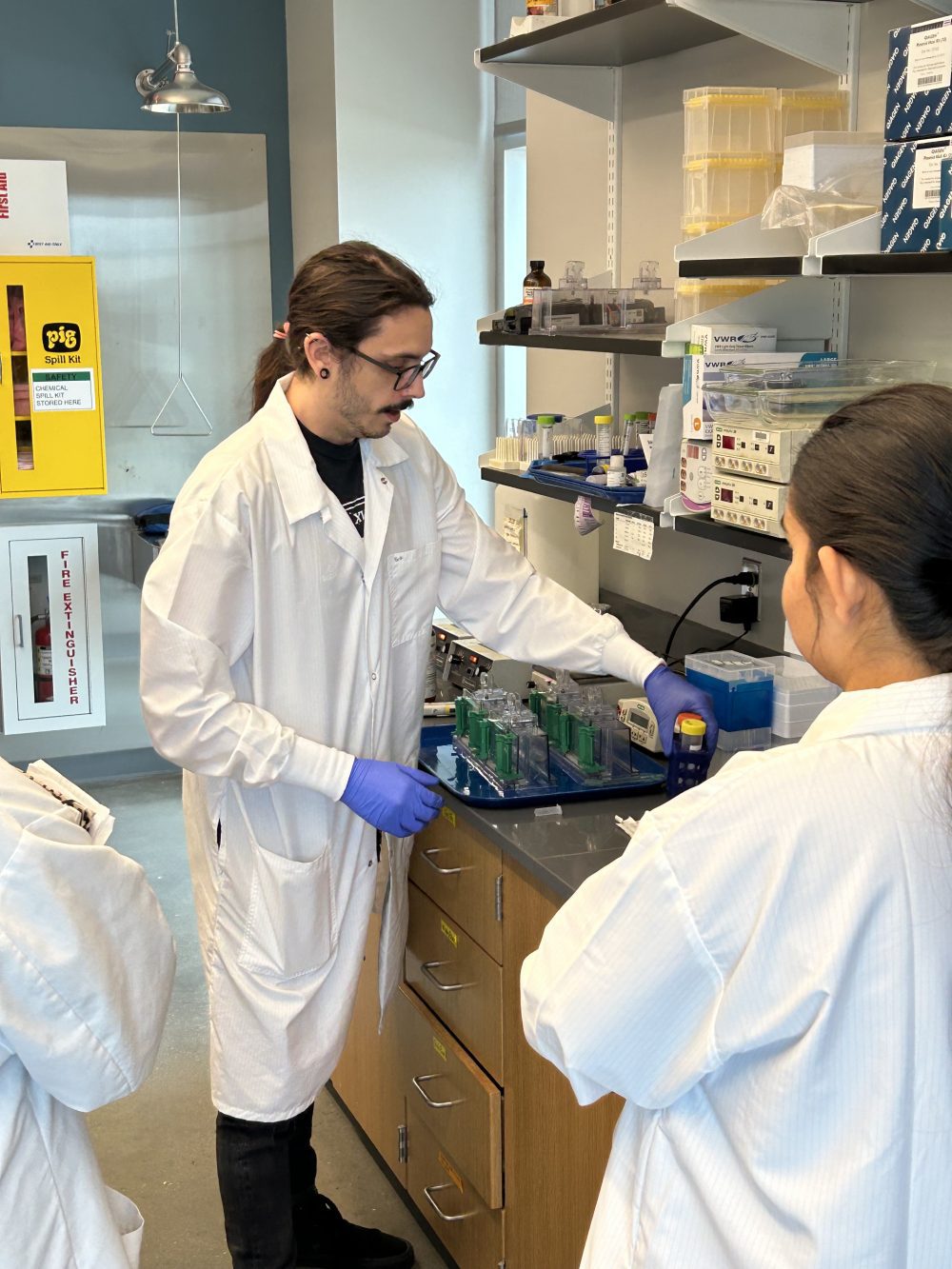
Alex Suptela works in a biology lab, demonstrating techniques to students.
UNC Charlotte faculty lead Team USA to win two grand championships in youth International Mathematics Competition
Only two grand prizes were given at the International Mathematics Competition this July, which drew 578 students who work in teams from 30 countries worldwide. For the first time in over a decade, one country has claimed both the lower age (up to sixth grade) and upper age (up to ninth grade) grand championship titles: USA. Team USA is composed of fifth to ninth grade students from across the U.S. and British Columbia. The youth trained and competed under UNC Charlotte faculty to win the two grand prizes, plus ten gold medals, four silver medals, and two bronze medals.
Tao Hong, Duke Energy Distinguished Professor of Industrial and Systems Engineering in the William States Lee College of Engineering, and Harold Reiter, professor emeritus of mathematics in the Klein College of Science, led the 16 students through a 10-day math camp in July. The camp offered more than just math problems: Hong and Reiter helped make math fun for the young enthusiasts through age-appropriate research lectures, visits from industry professionals, student-led presentations, field trips and more. Telra Institute provided the venue, and the Burroughs Wellcome Fund provided a grant to cover other costs. At the end of the camp, students dove into the competition online.
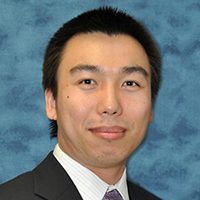
“Math is so much more than just solving problems and writing proofs; it brings people together,” said one student participant, speaking of the experience. “Now, I think of the competition as a stepping stool, there to remind me of how far math has taken me, and how far I have left to go.”
Although unable to attend the awards ceremony in Lucknow, India, the teams still “brought home” the trophies which are now proudly displayed on the UNC Charlotte campus, representing these future STEM scholars.
“STEM research has to be built on a solid foundation of K-12 school math,” said Hong. “Many young students with exceptional talents in math are ready and eager to move on to the next level. I’m very fortunate to work with these highly gifted elementary and middle schoolers. By connecting them to university professors and industry professionals, we can show them the world beyond the standardized tests.”
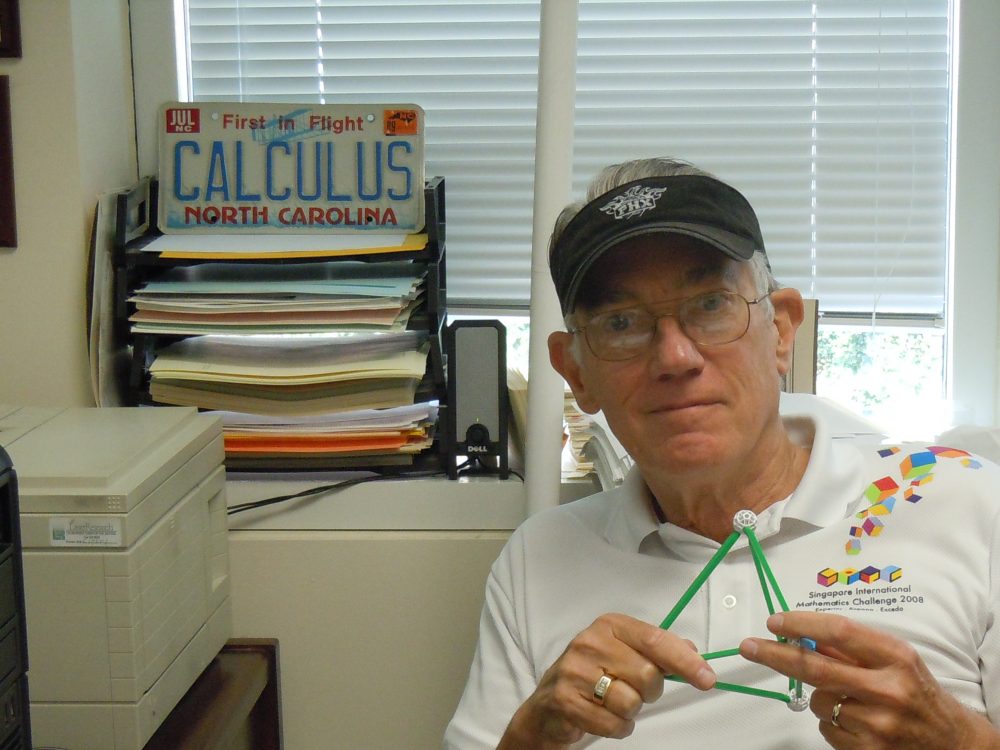
Team USA also placed well with individual wins in each age bracket:
- Upper ages (304 contestants): Leo Hong tied at 4th place and Jason Lee tied at 7th place.
- Lower ages (274 contestants): Brandon Ni and Andrew Lau tied at 2nd place and Daniel Sun tied at 5th place.
Hong and Reiter, as the team mentors and leaders, actively support students in developing strong math skills in grade school. This foundation supports the students as they age into higher-level STEM courses and enter the workforce.
The camp provided a strong foundational experience for the students to learn math and approach it inquisitively. “This will rank highly as one of [my child’s] most formative group experiences in math,” reported a parent of a student participant. “This year’s experience was nothing short of a complete success across the board, from selection to instruction to social activities and just ‘letting kids be kids.’ I cannot express more gratitude for Dr. Reiter launching this initiative, and for the way it has developed under Dr. Hong’s leadership. Thank you for this unparalleled experience.”
Learn more about Team USA and the summer camp.